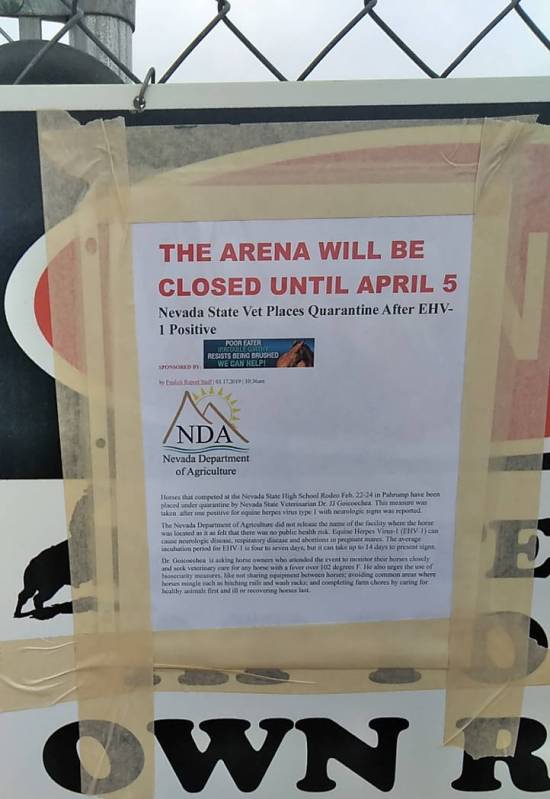
Officials with the Nevada Department of Agriculture have announced a quarantine on a horse facility in Clark County, after three positive cases of Equine Herpes Virus Type 1 (EHV-1), were discovered in that county.
Additionally, horses that competed at the Nevada State Junior/High School Rodeo which took place in Pahrump at McCullough Arena back in late February, may have been exposed and should be monitored for signs of disease, such as fever, cough, and, or runny nose.
The arena will remain closed until April 5.
As stated in a news release, the virus, complete with neurologic signs, was reported in Clark County, prompting State Veterinarian Dr. JJ Goicoechea to order a 14-day quarantine, which is subject to extension pending any additional cases that come up.
Additionally, the virus poses no health risk to other livestock.
Details about the Clark County facility was not be released per Nevada Revised Statute 571.160.
“I have issued this quarantine to help prevent the spread of disease during equine event season in Nevada and surrounding states,” Dr. Goicoechea said. “Equine Herpes Virus-1 can cause respiratory disease in young horses, abortions in pregnant mares and neurologic disease in older horses. It can be fatal to horses, but having horses current on their vaccines can help limit disease severity. Like viruses in humans, it has to run its course, and you only can treat the symptoms.”
The news release also noted that the average incubation period for EHV-1 is four to seven days, but some may take up to 14 days.
“Eight to 12 days after infection first appears, neurological disease may occur,” according to the release. “EHV-1 is a reportable disease, meaning when veterinarians diagnose it, they are required to notify the Nevada Department of Agriculture, per the NRS. Additional samples have been submitted and we are awaiting the test results.”
Additionally, Dr. Goicoechea said owners should monitor their horses for the disease and practice what is known as “biosecurity.”
The term is defined as doing everything possible to reduce chances of an infectious disease being transferred by people, animals, equipment or vehicles, as the virus can be transferred by way of boots, coats, gloves and equipment.
“I urge all horse owners to monitor their horses closely, taking temperatures twice daily and seeking veterinarian care for any fevers over 102 degrees,” Dr. Goicoechea said. “It is especially important to practice biosecurity to minimize the risk of spreading disease. Never share equipment between horses, and always wear clean clothes when going from ill horses to others.”
Though the virus does not pose a threat to humans, Goicoechea said humans can spread the disease to other horses.
“It is spread by grooming, feeding, and the like, which is why biosecurity is of utmost importance,” he said.
Officials also cautioned to always start chores with healthy horses, and end with the sick, or recovering horses.
They also advised to avoid common areas such as hitching rails, wash racks and other equipment during an outbreak.
As a longtime horse owner himself, Buddy Krebs raised a few concerns about the situation.
Krebs is also the director of the Pahrump Valley High School Rodeo Club.
“To my knowledge, there are no known cases in Nye County,” he said. “There are three in Clark County and there’s one up north somewhere. Nobody really knows where it originated. A horse was sick here, but I think that horse came here sick. They canceled the Logandale High School Rodeo, which was supposed to be this weekend, and statewide, the state veterinarian wants horse owners to be cautious. It’s better to be safe than sorry.”
For additional information, or to view a list of reportable diseases, log on to agri.nv.gov
Contact reporter Selwyn Harris at sharris@pvtimes.com, on Twitter: @pvtimes